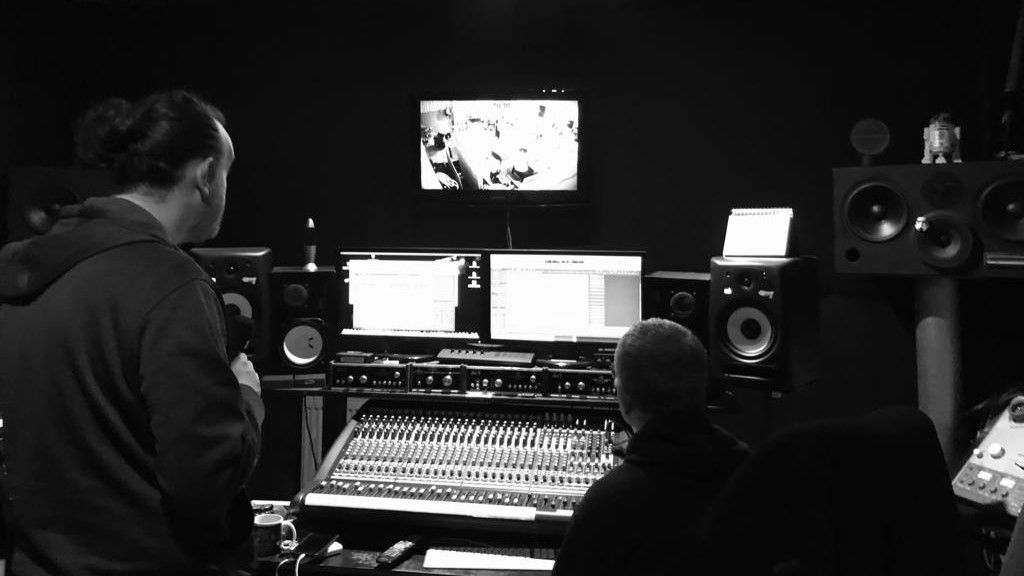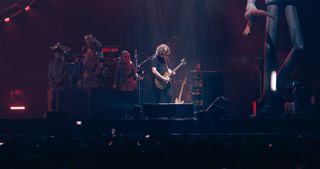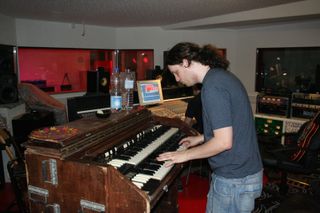A London musician recorded with Muse and Phil Collins, now he's co-producing with ChatGPT
A man's love for programming and music came together in a project with ChatGPT.

ChatGPT is a powerful tool that places AI into the hands of everyday people, but it has also proven controversial. Authors, journalists, and those in other creative professions have used ChatGPT to generate content in ways that's drawn criticism. Accusations of plagiarism and unoriginality are common, as are claims of laziness.
But that's only one side of the coin. I recently came across a musician who uses ChatGPT to co-produce music. Rather than merely asking the chatbot to write a song, David Domminney Fowler has a back-and-forth with the tool to refine music and influence creation at every step of the process.
I virtually sat down with Fowler to talk about his unique creative process and his plans to make an entire album with ChatGPT.
Fowler is a guitarist and singer in the Australian Pink Floyd Show. He's also been in other bands, including Juice, Space Potatoes, Dean Howard Band, and Audial. He's been a producer and engineer since age 19. Over the years, he's recorded with Muse, Wilco Johnson, Phil Collins, and Ian Gillian.
In addition to his work in the music industry, Fowler has been a developer and programmer from a young age. He started out on an Acorn electron when he was six years old and said he "never looked back."
It’s very human like in that way, it needs to show it’s working and without keeping notes it loses its way quickly.
David Domminney Fowler
The combination of his passion for development and music created a unique opportunity to test out ChatGPT. Fowler noted the importance of understanding how to work with AI and how it differs from creating with a human:
"I think a lot of people think of what they want out of a prompt and are disappointed when it's not what they expect, but they don't invest the time that you would invest with a human to get decent results. Some ask a couple of things and are unmoved by the technology and some are so blown away by the human-like feel that they don't really test it objectively."
Get the Windows Central Newsletter
All the latest news, reviews, and guides for Windows and Xbox diehards.
Fowler fell into the same habits himself:
"At first I did both, I think we all have ups and downs with it, but having used GitHub Copilot during its beta and also having done some recreational neural network projects myself I knew that it's neither sentient or nonsense. You just have to work out its limits and establish a method of communication, allow it to correct itself, and avoid getting in loops. It's just a function call after all."
Rather than entering a few prompts and hoping for the best, Fowler emphasized a back-and-forth to get in-depth and accurate responses.

You may be asking the same question I did. "ChatGPT doesn't write sheet music. How do you get it to create music?" Getting to that point was a trial-and-error process:
"This is where establishing communication methods is important. After a few bad attempts at trying to get it to give me melodies and chord sequences my approach changed," said Fowler.
"I wrote some JavaScript functions that add chords to a midi file and then expanded that to be able to have multiple tracks and melodies, drums, and bass lines. By copying the code / functions into ChatGPT it would know how to add chords and melodies etc. It could then generate code that I could run to make a midi file which contains all the music data."

ChatGPT surprised Fowler with how well it seemed to understand code and queries, though the bot has not been perfect.
"At first I was teaching it through examples but more recently I'm just coping a function in and asking it what it does. Once it's seen all the functions it just knows it without explanation. I suppose that's the mark of a good bit of code, understandable without comments," said Fowler.
Occasionally, ChatGPT will make a mistake like generating a 14-bar chord instead of a 16-bar chord. This can be fixed by asking the bot to keep count of each bar. Fowler said, "it's very human-like in that way, it needs to show it's working and without keeping notes it loses its way quickly."
Similarly to what others have run into, Fowler has seen ChatGPT get stuck in loops, though he's found workarounds.
As many artists do, ChatGPT created a stage name for itself. The bot called itself Ch@, presumably pronounced "chat." The first piece Ch@ co-produced with Fowler is called Euphoric Progression. It's a simple set of chord sequences. Fowler explained that each song in his upcoming album will "represent something new [ChatGPT] can do."
The next step is to get human musicians to play music generated by ChatGPT. Fowler's second and third pieces are deep in development. He also wants to use GitHub Copilot as an assistant engineer.
While ChatGPT, or Ch@, is not human, Fowler is treating it like any artist he co-produces with. "I vow to only do what I would do for an artist if I were producing their album, which means sometimes quite a lot, and sometimes almost nothing. But what happens in the studio stays in the studio."

Sean Endicott is a tech journalist at Windows Central, specializing in Windows, Microsoft software, AI, and PCs. He's covered major launches, from Windows 10 and 11 to the rise of AI tools like ChatGPT. Sean's journey began with the Lumia 740, leading to strong ties with app developers. Outside writing, he coaches American football, utilizing Microsoft services to manage his team. He studied broadcast journalism at Nottingham Trent University and is active on X @SeanEndicott_ and Threads @sean_endicott_.